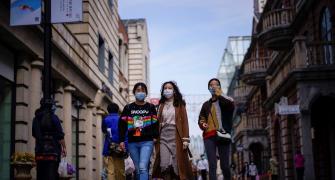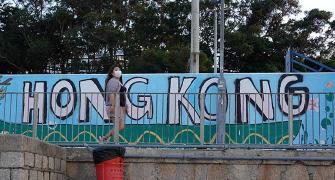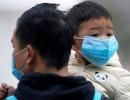'The virus of trust deficit seems to be taking a toll of the friendship built over the years by succeeding leaderships of the two countries,' notes Rup Narayan Das.

It was only less than six months ago that Prime Minister Narendra Damodardas Modi and Chinese President Xi Jinping met in Mamallapuram in October last year at their second informal meeting.
The photo opportunity exuded bonhomie and camaraderie.
Together they discussed events to be organised by both countries on the occasion of commemoration of the establishment of the diplomatic relations between the two countries this year.
Xi also invited Modi to visit China for the third round of their informal meetings.
Then came the deluge -- COVID-19.
During the critical period, the two countries maintained the channel of communication which helped evacuate the Indian community stranded there in Wuhan and other places of China.
India also as a mark of humanitarian gesture despatched medical supplies consisting of masks and protective medical gears to China at a time when there is demand for such items in the country.
Modi wrote to Xi, who in turn expressed his gesture to India at a critical time.
There was also exchange of letters between External Affairs Minister Dr S Jaishankar and his Chinese counterpart Wang Yi.
Then there seems to be a pause. An eerie silence.
Sometimes, silence is louder than words.
This seems to be happening in the narrative of the relationship between the two countries.
April 1, which marks the 70th anniversary of the establishment of diplomatic relations between the two countries, passed off quietly without any event, courtesy COVID-19.
The ministry of external affairs said due to the COVID-19 pandemic, India and China have not been able to prepare and carry out various activities that had been planned to celebrate the 70th anniversary.
Even as both countries continue to address the challenges posed by the pandemic, the MEA said they remain engaged in discussion on commemorating the anniversary in a manner truly reflective of its significance and the common aspirations of their peoples.
President Ram Nath Kovind, Prime Minister Modi and External Affairs Minister Jaishankar wrote letters to their counterparts.
In his message to Chinese Premier Li Keqiang, Modi noted that the 'COVID-19 pandemic was a reminder to us of the interconnected nature of our world today and the need therefore to adopt a truly global response to it.'
Modi said he was looking forward to working together to 'further deepen and strengthen the Closer Developmental Partnership and take it even to greater heights.'
After that, there has been some disquiet.

What needs to be read between the lines is that Prime Minister Modi, who is a consummate communicator, spoke to almost all world leaders recently, but not to a top Chinese leader -- neither President Xi nor Premier Li, suggesting the disquiet in the relationship between the two countries.
The postings on social media in India reflected the peeve of the Indian people.
The mood of the nation was aired by the government's decision, when the ministry of Hhome affairs reiterated its earlier advisory not to use the video conferring software Zoom by officers and officials presumably on the suspicion that some of its encryption keys were routed through China-based servers.
In another move, the Government of India reviewed its FDI policy on April 17 to pre-empt an opportunistic takeover and acquisition of Indian companies during the COVID-19 pandemic.
The move was triggered by the People's Bank of China increasing its share in the Housing Development Finance Corporation Ltd.
The Chinese bank's share in HDFC increased from 0.87% to 1.01%
The virus of trust deficit seems to be taking a toll of the friendship built over the years by succeeding leaderships of the two countries.
To remedy the trust deficit, China needs to demonstrate and convince the world at large and India, in particular of its sincerity.
Had China shared the information about the outbreak of the coronavirus well in advance, perhaps things would have been much better.
Preventive measures could have been put in place.
China needs to be more transparent if it wants to earn the goodwill and trust of other countries.
Soft power is not doling out money alone.
Trust and transparency are perhaps the most potent soft power.
It is time that China sheds Sun Tzu's dictum of deception as part of its strategic culture.

Be that as it may, diplomacy is the art of possibility and there can always be a new beginning.
It must not be forgotten that the two countries are neighbours and one can choose one's friends, but not one's neighbours.
The destiny of the two countries is intertwined seamlessly.
People-to-people contact between the two countries has increased manifold over the years.
Trade and commerce have increased.
While Chinese companies have invested in India, Indian companies have also invested in China.
Many in China and India earn their livelihood through trading between the two countries.
If you visit Kunming airport in China's Yunnan province -- which is about a two hour flight from Kolkata -- one can see Indians with huge bags full with trading commodities.
Indian students study in China. Similarly, Chinese students -- though much fewer in number -- study in India.
Nationals of both countries work in China and India.
Bilaterally, a number of institutional mechanisms -- the most important being the Special Representative talks -- need to function.
There are multilateral organisations like BRICS, the SCO, which India is hosting this year, the ASEAN Forum, the G-20, where the leaders of the two countries have to interact and engage with each other.
All these outreach platform demand a conducive and congenial atmosphere.
The fact remains that the coronavirus, which originated from China, willy-nilly has brought death and devastation to hundreds of thousands of people all over the world.
India rose to the occasion to mitigate the suffering not only through its medical help, but more importantly by providing the drug hydrochloroquine to countries rich and poor, which has certainly enhanced India's prestige in the world.
India is certainly not a rich country like China, but certainly it has a rich heart.
We may not partake in the world's prosperity benefiting from global trade, but we can always be there in the times of need.
Rup Narayan Das, PhD is a senior fellow at the Indian Council of Social Science Research at the Indian Institute of Public Administration, New Delhi.









